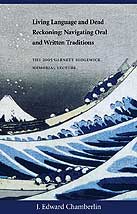Living Language and Dead Reckoning: Navigating Oral and Written Traditions

Living Language and Dead Reckoning
Navigating Oral and Written Traditions
by J. Edward Chamberlin
$9.95
- Autumn 2006
- print ISBN: 978-1-55380-037-8
- ebook ISBN: 978-1-55380-398-0
- PDF ISBN: 978-1-55380-399-7
- 5-3/4″ x 9″ Trade Paperback, 36 pages
- Literary Criticism
- Out of print
In this highly personal essay, Ted Chamberlin asks some old, old questions such as “why do we need stories and songs?” Turning frequently to First Nations people, he looks at their culture and asks what it means to listen. In response, he notes that we take great pleasure in the comforts of narration, of finding our way within a story, a kind of “dead reckoning” out at sea when the fog rolls in and we experience “being almost lost.”
Much of the essay focuses on people from around the world who have often been described as pre-literate. Chamberlin takes issue with this view and argues that such people “read” a whole host of signs and stories, and that in understanding how this reading takes place we can understand something of our own habits of reading and listening. Whereas scholars such as McLuhan and Ong have claimed that such cultures are “imprisoned in the present,” Chamberlin points out that this is demonstrable nonsense. All cultures are both oral and written, he argues, and knowledge comes from both listening and reading.
Employing his own position as a “teller of tales” he asks whether we believe the teller or the tale, and draws attention to the importance of not only the storyteller but also the community of listeners. For Chamberlin, Living Language and Dead Reckoning, the publication of the Garnett Sedgewick annual lecture for 2005 at the University of British Columbia, is the first step towards a “history of listening.”
Reviews:
“The music of [Chamberlin’s] prose invites — demands — close listening.”
—Canadian Literature“In this insightful, entertaining and at times wistful essay, Ted Chamberlin equates literacy with ‘dead reckoning,’ and urges us to reconsider the many advantages of orality, which include a sense of community and the presence of the teller of tales.”
—Dr. Gernot Wieland, Head, English Department, University of British Columbia
Garnett Sedgewick Memorial Lectures:
- From There: Some Thoughts on Poetry & Place by Stephen Burt (2015)
- More Heat than Light: Sex-difference Science & the Study of Language by Deborah Cameron (2012)
- Marvellous Repossessions: The Tempest, Globalization and the Waking Dream of Paradise by Jonathan Gil Harris (2011)
- John Donne and the Line of Wit: From Metaphysical to Modernist by P.G. Stanwood (2008)
- Spontaneous Overflows and Revivifying Rays: Romanticism and the Discourse of Improvisation by Angela Esterhammer (2004)
- “Servile Ministers”: Othello, King Lear and the Sacralization of Service by Michael Neill (2003)
- Grandchild of Empire: About Irony, Mainly in the Commonwealth by W.H. New (2002)
- The Generation of Caliban by Jonathan Goldberg (2001)
- Double Crossings: Madness, Sexuality and Imperialism by Anne McClintock (2000)
- Professing English at UBC: The Legacy of Roy Daniells and Garnett Sedgewick by Sandra Djwa (1999)



